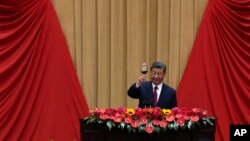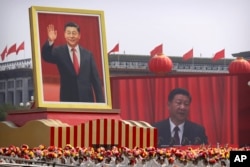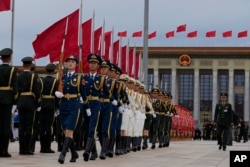China is marking the 75th year of Communist Party rule as economic challenges and security threats linger over the massive state.
No festivities have been announced for the occasion Tuesday, save for a flag-raising ceremony at Tiananmen Square, with an honor guard marching from the entrance of the sprawling palace that in past centuries was the home of Chinese emperors.
The entirely state-controlled media ran constant reports on China's economic progress and social stability, with no mention of challenges ranging from a declining birth rate to the disruption in supply chains that has harmed the largely export-driven economy.
Commemorations were also held in the former British colony of Hong Kong and Portugal's former territory of Macao, both of which returned to Chinese sovereignty in the late 1990s in a key indication of Beijing's determination to overcome what it has called a “Century of Humiliation.”
In recent decades, China has mounted military parades and displays of the country's economic might only at the turn of decades, such as for the 60th and 70th anniversaries.
The world’s second largest economy has struggled to regain momentum after the COVID-19 pandemic.
A prolonged property slump led to a spillover effect on other parts of the economy, from construction to sales of home appliances. Last week, China announced a slew of measures to boost the economy, including lower interest rates and smaller down payment requirements for mortgages.
Party leader and head of state Xi Jinping has largely avoided overseas travel since the pandemic, while continuing with his purges at home of top officials considered insufficiently loyal or being suspected of corruption or personal indiscretions.
"The road ahead will not be smooth, there will definitely be difficulties and obstacles, and we may encounter major tests such as high winds and rough seas, or even stormy waves” Xi warned during a banquet on the eve of the anniversary.
“We must be vigilant in times of peace, plan ahead, and rely closely on the entire Party, the entire army, and people of all ethnic groups across the country," he said, adding "no difficulties can stop the Chinese people from moving forward.”
The anniversary also comes as China is facing growing frictions with neighbors including Japan, South Korea and the Philippines over territorial claims and their close relationships with Beijing’s chief rival, the United States.
The Communists under Mao Zedong seized power in 1949 amid a civil war with the Nationalists, also known as the KMT, led by Chiang Kai-shek, who shifted their political, economic and military power to the now self-governing island democracy of Taiwan.
Beijing continues to insist Taiwan must be annexed under Communist Party rule, by force if necessary, while the U.S. has provided arms to ensure its defense.
China, meanwhile, has involved itself in disputes over its claims to most of the South China Sea and uninhabited islands held by Japan, the Philippines, Vietnam and other neighboring nations.
China's military buildup and its recent launch of a nuclear capable ballistic missile into the Pacific Ocean have raised concerns about a possible conflict.
At home, Xi has made himself effectively leader for life by ending term limits and extending his power over key government and party bodies. China allows no competitive elections and the party retains near total control over the media that informs its 1.4 billion people.








